Best Mesh Generation Software
Posted December 1, 2012 at 07:59 by Far
Rule of thumb:
1. Use the mesh generator which is being used by your friends who are available to help you out.
2.Best sotware in market is ICEM (Hexa), but it is difficult to learn and takes alot time in mastering. Its tetra + prism version is very efficient and easy to use.
3. Ansys meshing is new technology and very easy to use.
4. Gambit is very easy to learn and its tetra with boundary layer (in 3d implementing boundary layer often produces error) is very good. Its size functions are awesome and some of them are also implemented in ICEM CFD. So if this product is available in your lab then it is best idea to start with gambit.
5. Gridgen is very good mesher and has technology of hexa, tetra and T-Rex (equalivalent for prisms). It produces very highly quality meshing. It has the capability to produce the hybrid meshes and which is its plus point as compared to ICEM. ICEM can produce the hybrid meshes, but it is cumbersome.
6. T-grid is also very good unstructured mesher, but it requires surface mesh. It is mostly used in automotive industry. Tgrid has advantage of producing very large mesh (more than 40 million) in very short time and use very less computational resources. A desktop with 8 gb RAM and corei7 would be enough for this task.
7. You can use combination of different meshers. For example recently one of my freind used the Gambit and ICEM. They used Gambit for geometry cleaning (also reproduces some dirty parts) and tetra volume mesh. This mesh was saved in .msh format and imported into ICEM. Where with build topoogy underlying goemtry was reproduced and then prism mesh was extruded from the tetra mesh near to wall surface.
8. Some times people also use the ANSA for surface mesh and then either Tgrid or ICEM for volume mesh. Mostly for automotive meshing. ICEM is popular in aerospace, external analysis of automotive, turbo-machinery and any other complex geometry.
If you ask for my preference I would say:
1. For learning purpose start with Gambit or gridgen.
2. For hybrid mesh use Gridgen.
3. For high quality hexa meshes use ICEM CFD
4. For turbomachinery use turbogrid. But it is limited to predefined geometries.
5. Tgrid for very large unstructured meshes and very complex geometries.
For exact advise please tell us the following info:
a) Problem type and geometry. Please past some pics
b) which software(s) is (are) available to you.
1. Use the mesh generator which is being used by your friends who are available to help you out.
2.Best sotware in market is ICEM (Hexa), but it is difficult to learn and takes alot time in mastering. Its tetra + prism version is very efficient and easy to use.
3. Ansys meshing is new technology and very easy to use.
4. Gambit is very easy to learn and its tetra with boundary layer (in 3d implementing boundary layer often produces error) is very good. Its size functions are awesome and some of them are also implemented in ICEM CFD. So if this product is available in your lab then it is best idea to start with gambit.
5. Gridgen is very good mesher and has technology of hexa, tetra and T-Rex (equalivalent for prisms). It produces very highly quality meshing. It has the capability to produce the hybrid meshes and which is its plus point as compared to ICEM. ICEM can produce the hybrid meshes, but it is cumbersome.
6. T-grid is also very good unstructured mesher, but it requires surface mesh. It is mostly used in automotive industry. Tgrid has advantage of producing very large mesh (more than 40 million) in very short time and use very less computational resources. A desktop with 8 gb RAM and corei7 would be enough for this task.
7. You can use combination of different meshers. For example recently one of my freind used the Gambit and ICEM. They used Gambit for geometry cleaning (also reproduces some dirty parts) and tetra volume mesh. This mesh was saved in .msh format and imported into ICEM. Where with build topoogy underlying goemtry was reproduced and then prism mesh was extruded from the tetra mesh near to wall surface.
8. Some times people also use the ANSA for surface mesh and then either Tgrid or ICEM for volume mesh. Mostly for automotive meshing. ICEM is popular in aerospace, external analysis of automotive, turbo-machinery and any other complex geometry.
If you ask for my preference I would say:
1. For learning purpose start with Gambit or gridgen.
2. For hybrid mesh use Gridgen.
3. For high quality hexa meshes use ICEM CFD
4. For turbomachinery use turbogrid. But it is limited to predefined geometries.
5. Tgrid for very large unstructured meshes and very complex geometries.
For exact advise please tell us the following info:
a) Problem type and geometry. Please past some pics
b) which software(s) is (are) available to you.
Total Comments 15
Comments
-
 Hello Far,
Hello Far,
I am using ICEM, but have recently heard about about Gmsh.
"Gmsh is a 3D finite element grid generator with a build-in CAD engine and post-processor."
Easy to use according to the people who have used it. I just heard it today so thought it might be useful information for others here. Although i haven't used it.
One can get the software for free from website below:
http://geuz.org/gmsh/
Regards.Posted January 14, 2013 at 11:15 by Smaras 
Updated January 14, 2013 at 11:15 by Smaras (forgot to add one line) -
 what about polyhedral mesh?
what about polyhedral mesh?Posted July 26, 2014 at 03:09 by aroma 
-

Posted July 26, 2014 at 07:11 by Far 
-
 What about star-CCM+? I found that very easy and efficient in polyhedral mesh generation. Have you made any comparison between Fluent poly and Star-CCM+ polyhedral mesh?
What about star-CCM+? I found that very easy and efficient in polyhedral mesh generation. Have you made any comparison between Fluent poly and Star-CCM+ polyhedral mesh?
regardsPosted July 27, 2014 at 08:06 by aroma 
-
 I have no experience with star-ccm+...Quote:
I have no experience with star-ccm+...Quote:
Never did the comparison between fluent and star ccm+. But i believe there is no need for polyhedra meshes...Posted July 27, 2014 at 08:29 by Far 
-
 I had a study about that. using polyhedral mesh result in faster solution in some cases
I had a study about that. using polyhedral mesh result in faster solution in some casesPosted July 27, 2014 at 15:54 by aroma 
-
 A reply from Simon (post # 2 particularly)Quote:
A reply from Simon (post # 2 particularly)Quote:
http://www.cfd-online.com/Forums/ans...l-meshing.html
It is mentioned there that CFX is already a polyhedra solver by default, but it does not accept poly meshes...
Fluent can easily handle poly meshes etc...
There is some advantage of poly meshes in case of high swirl, which CFX automatically gives you, as it is already solving equations on poly meshes...
But you can not avoid bad quality in narrow gap with the help of poly...
Poly is inverse of tetra...
There is no standard method to measure the quality of poly mesh...
So in short "poly will not be the magic solution to CFD problems"Posted July 27, 2014 at 16:50 by Far 
-
 hi, I will be performing hydrodynamic simulations to assess turbulence in porous obstructions and I will use OpenFOAM as the platform to perform the simulations. What is the best tool (software) to generate the computational grid for OpenFOAM for complicated flow domains? it can be commercial or open source.
hi, I will be performing hydrodynamic simulations to assess turbulence in porous obstructions and I will use OpenFOAM as the platform to perform the simulations. What is the best tool (software) to generate the computational grid for OpenFOAM for complicated flow domains? it can be commercial or open source.Posted March 3, 2015 at 09:28 by saharhad 
-
 Hi, i wanna perform a Conjugate heat transfer analysis... basically its a 3D gas turbine blade film cooling simulation in ANSYS Fluent...U can see my geometry in pics attached...the blade is twisted & tapered and has internal cooling geometry and hole rows on it...its quite complex geometry
Hi, i wanna perform a Conjugate heat transfer analysis... basically its a 3D gas turbine blade film cooling simulation in ANSYS Fluent...U can see my geometry in pics attached...the blade is twisted & tapered and has internal cooling geometry and hole rows on it...its quite complex geometry
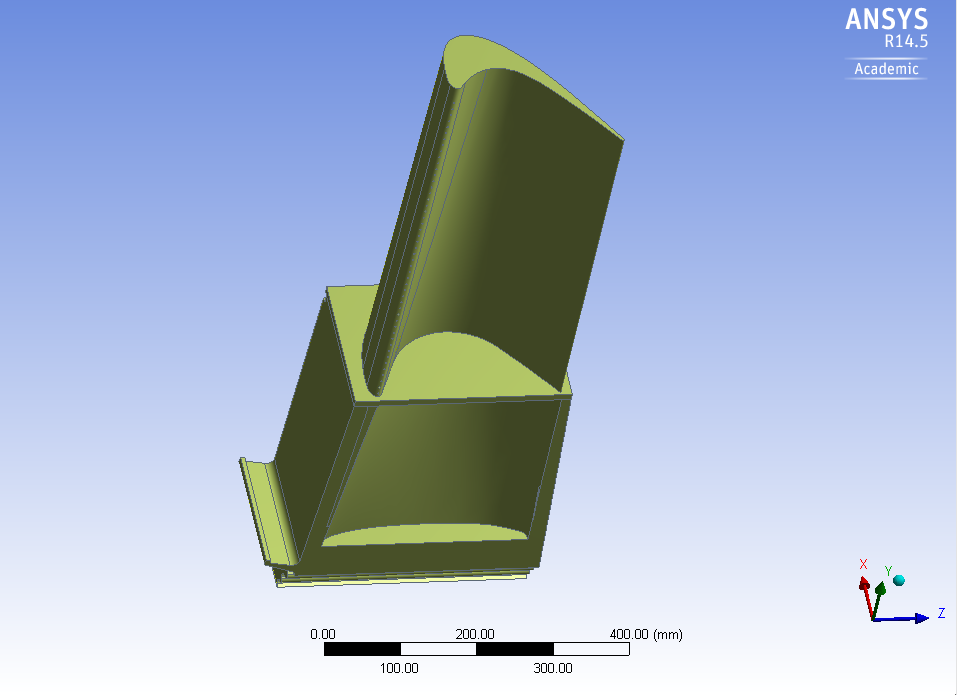
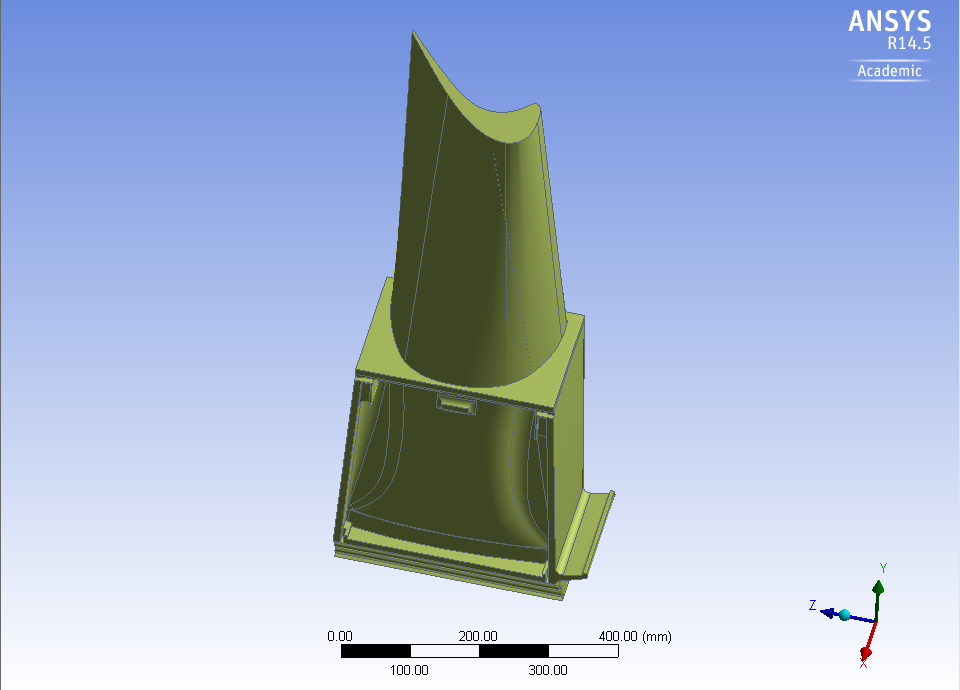
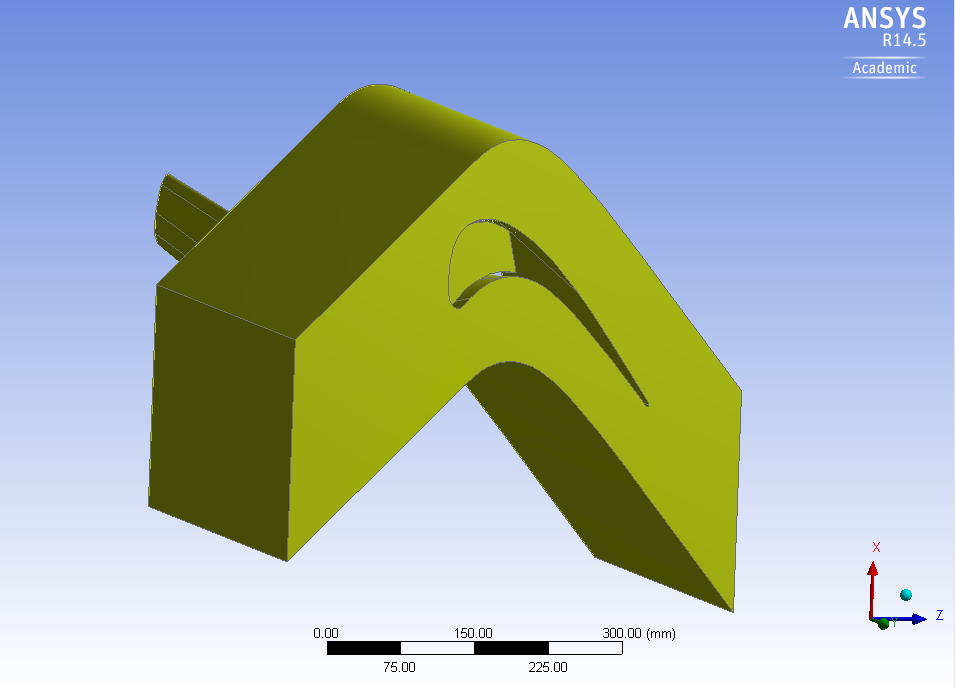
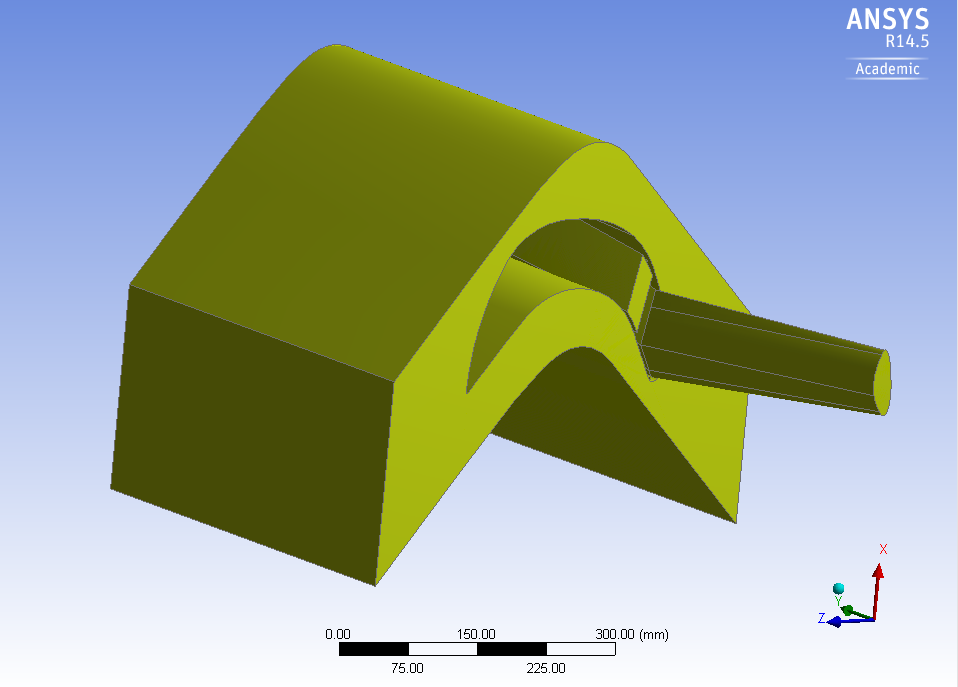
Currently i'm using ansys workbench meshing but i'm getting oscillating residuals in Fluent because of bad cells...Can anyone plz suggest me the most suitable meshing software for my geometry?
Softwares available: ICEM CFD,Fluent T-grid, Turbogrid, Hypermesh
Please answer as soon as possible...Posted June 3, 2016 at 22:57 by diwakar 
-
 Any software if used properly should give good quality mesh. But I would recommend ICEM CFD Hexa or TetraQuote:Hi, i wanna perform a Conjugate heat transfer
Any software if used properly should give good quality mesh. But I would recommend ICEM CFD Hexa or TetraQuote:Hi, i wanna perform a Conjugate heat transfer
Currently i'm using ansys workbench meshing but i'm getting oscillating residuals in Fluent because of bad cells...Can anyone plz suggest me the most suitable meshing software for my geometry?
Softwares available: ICEM CFD,Fluent T-grid, Turbogrid, Hypermesh
Please answer as soon as possible...Posted June 4, 2016 at 17:33 by Far 
-
 yep i agree but if you want to run faster with an acceptable/good mesh ansys meshing is the tool. For other academic purpose that need only hexa i suggest ICEM. if you need polyhedral then you can convert your tetra mesh easily in fluent clicking a button.
yep i agree but if you want to run faster with an acceptable/good mesh ansys meshing is the tool. For other academic purpose that need only hexa i suggest ICEM. if you need polyhedral then you can convert your tetra mesh easily in fluent clicking a button.Posted June 10, 2016 at 09:18 by aerospace84 
-
 then if you have bad cell clean the geometry, put some virtual surface and set properly the mesh sizes..it works in the 99.999% of cases
then if you have bad cell clean the geometry, put some virtual surface and set properly the mesh sizes..it works in the 99.999% of casesPosted June 10, 2016 at 09:20 by aerospace84 
-
 Thanks for replying to my post Far and aerospace84...The problem that i'm having in my case is that, when I start solution in Fluent initially residuals keep falling but after a few thousand iteration my residuals keep oscillating in a straight line...it looks like its stuck forever...I have tried solving it with different viscous models, also lowered under relaxation factors and tried to change solution methods...but its not helping...I thought i have bad mesh thats why i wanted to improve mesh with some other meshing software...but when i checked my mesh metrics i.e. skewness, aspect ratio etc. looks good in ansys meshing...so if my mesh is already good enough then whats stopping my case from converging?
Thanks for replying to my post Far and aerospace84...The problem that i'm having in my case is that, when I start solution in Fluent initially residuals keep falling but after a few thousand iteration my residuals keep oscillating in a straight line...it looks like its stuck forever...I have tried solving it with different viscous models, also lowered under relaxation factors and tried to change solution methods...but its not helping...I thought i have bad mesh thats why i wanted to improve mesh with some other meshing software...but when i checked my mesh metrics i.e. skewness, aspect ratio etc. looks good in ansys meshing...so if my mesh is already good enough then whats stopping my case from converging?
can anyone please help me with this?Posted June 12, 2016 at 16:16 by diwakar 
-
 Hello i'm looking for the best tools to perform the following task:
Hello i'm looking for the best tools to perform the following task:
I have 3D-Parts designed with CATIA V5, which are connected to eachother for example by welding points. These 3D Assemblies shall be converted to a 2D-Mesh (triangular), which represents the surface of the assembly and the electrical proberties (including the connections). The Data shall be send as a NASTRAN-File. This File will be processed with ANSYS HFSS and/or Altaire Feko, to simulate Radioantennas attached to the assembly.
Which Mesher will be the best, if i want as much automatisation as possible?Posted December 13, 2016 at 09:30 by Virgil 
-
 Ennova is a commercial pre- post- processor that can import, clean and repair CAD and generate tet + prism meshes or polyhedral meshes with boundary layers. Can also do block structured meshes like ICEM HEXA. Developed by the same team that created ICEM CFD. Free for students ! Reasonable cost for commercial applications. Visit www.ennova-cfd.com. Thanks -Mike
Ennova is a commercial pre- post- processor that can import, clean and repair CAD and generate tet + prism meshes or polyhedral meshes with boundary layers. Can also do block structured meshes like ICEM HEXA. Developed by the same team that created ICEM CFD. Free for students ! Reasonable cost for commercial applications. Visit www.ennova-cfd.com. Thanks -Mike
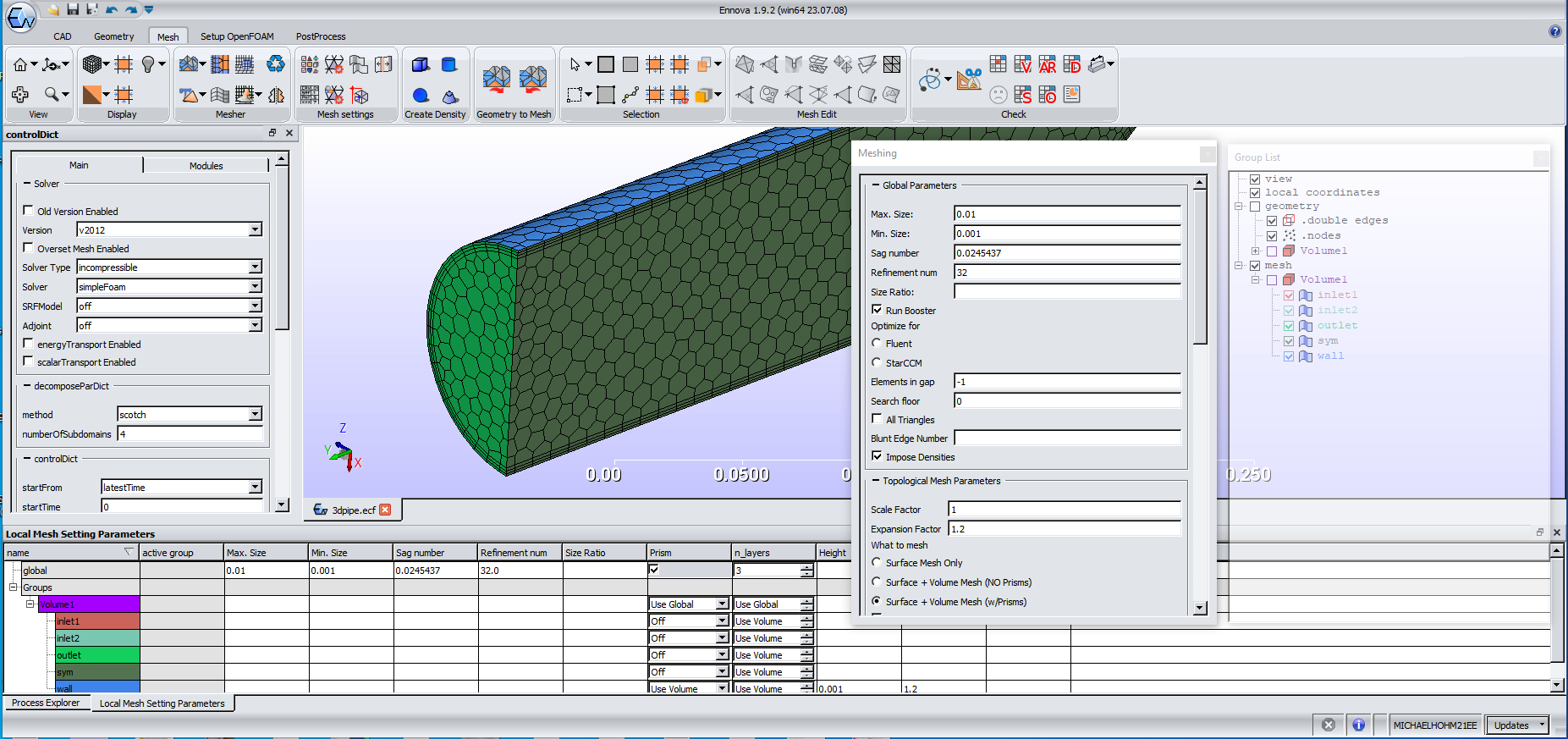
Posted August 9, 2023 at 15:31 by hohmeyer 
Updated August 10, 2023 at 15:24 by hohmeyer (Add an image)







